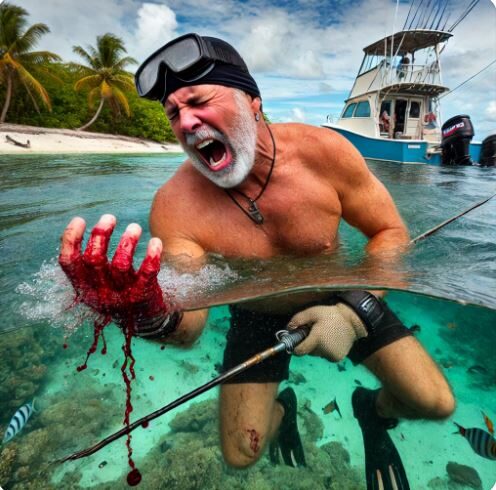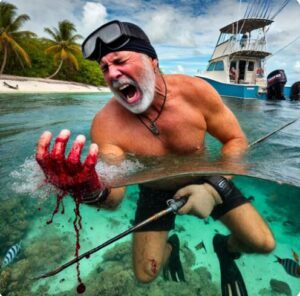Share this post
Dr. Jason Pirozzolo Discusses Spearfishing and the Potential for Severe Hand Injuries
Spearfishing is a thrilling sport that requires precision, skill, and respect for the ocean’s unpredictable conditions. For one 54-year-old fishing charter owner at A&B Marina, a routine day of spearfishing near the Dry Tortugas took a dangerous turn. A moment of mishandling his spear resulted in a hand puncture wound with extensor tendon injury, threatening his ability to continue working and doing what he loves. According to Dr. Jason Pirozzolo, an expert in sports medicine and injury recovery, “Spearfishing injuries are more common than most people realize. The combination of sharp equipment, high-pressure underwater conditions, and sudden movements increases the risk of severe trauma.”
The Mechanics of a Spearfishing Injury
When handled improperly, a spear gun or pole spear can cause deep puncture wounds that damage muscles, tendons, and nerves. In this case, the fisherman misfired his spear while attempting to reload, causing it to puncture the extensor tendon in his hand. This tendon is crucial for finger and wrist movement.
Dr. Jason Pirozzolo explains, “Puncture wounds pose a unique risk because they can introduce bacteria deep into the tissue, increasing the chance of infection. When a tendon is involved, the injury is even more serious because it can compromise hand function.”
Besides that, the ocean is filled with bacteria that thrive in warm saltwater. If not treated immediately, an open wound from a spearfishing accident can lead to cellulitis, abscess formation, or even necrotizing infections.
Signs of a Tendon Injury After a Puncture Wound
While puncture wounds may appear minor externally, internal damage can be significant. Dr. Jason Pirozzolo highlights several key symptoms that indicate a more serious injury:
- Inability to straighten fingers or wrist
- Pain that worsens with movement
- Swelling and bruising around the wound
- Weak grip strength
- Signs of infection, including redness, warmth, and pus
Most importantly, delayed treatment of a tendon injury can lead to permanent loss of function.
Emergency Care for a Spearfishing Hand Injury
A puncture wound should never be ignored, especially when it involves deep tissue damage or tendons. In this case, the fisherman sought urgent care in Key West, where medical professionals cleaned the wound, assessed the tendon damage, and immobilized the hand.
Dr. Jason Pirozzolo emphasizes, “Deep puncture wounds need professional evaluation. Immediate irrigation and antibiotic coverage can prevent serious infections. When a tendon is involved, surgical repair may be necessary.”
In this scenario, an orthopedic surgeon performed a tendon repair procedure to reconnect the severed extensor tendon. The fisherman faced weeks of immobilization to allow proper healing.
Recovery Timeline and Rehabilitation
Tendon injuries require a structured recovery process to restore hand function. The fisherman’s recovery included:
- Initial Immobilization (0-3 weeks):
- The hand was placed in a splint to prevent movement.
- Oral antibiotics were prescribed to prevent infection.
- Early Mobilization (4-6 weeks):
- Gentle range-of-motion exercises were introduced.
- A physical therapist monitored progress to prevent stiffness.
- Strength and Coordination Phase (7-12 weeks):
- Gradual strengthening exercises helped rebuild grip function.
- The fisherman practiced fine motor skills necessary for his daily activities.
- Full Recovery (3-6 months):
- By the three-month mark, most tendon repairs allow for near-normal function.
- The fisherman returned to guiding fishing tours with minor grip strength limitations.
According to Dr. Jason Pirozzolo, “Tendon injuries heal slowly because they have poor blood supply. Patients must follow their rehabilitation protocol carefully to regain full function.”
Preventing Spearfishing-Related Hand Injuries
Spearfishing enthusiasts can reduce their risk of injury by following safety precautions. Dr. Jason Pirozzolo recommends:
- Proper Handling Techniques: Always keep fingers away from the trigger or band tension area when reloading.
- Use Protective Gloves: Gloves offer grip support and protect against puncture wounds.
- Inspect Equipment Regularly: Ensure the spear gun’s trigger mechanism is working properly to prevent accidental discharge.
- Be Mindful of Ocean Conditions: Choppy water can make handling a spear gun more difficult, increasing the risk of mishaps.
- First Aid Knowledge: Carry a waterproof first aid kit with antiseptics and wound dressings.
“Preventing an injury is always easier than recovering from one,” says Dr. Jason Pirozzolo.
Returning to Work and Long-Term Outcomes
For a fishing charter owner, hand function is essential. Handling equipment, tying knots, and assisting customers all require fine motor control. While this fisherman made an impressive recovery, some tendon injuries can result in lifelong stiffness or weakness.
Dr. Jason Pirozzolo explains, “Patients who experience a tendon injury should work closely with their physician and physical therapist to regain as much mobility as possible. The right rehabilitation plan can determine whether they return to full function or experience long-term deficits.”
Despite the setback, this fisherman was able to resume his charter business, using a customized grip assist for certain tasks. His experience serves as a cautionary tale for anyone engaging in high-risk ocean sports.
Final Thoughts from Dr. Jason Pirozzolo
Spearfishing injuries are a real risk, and proper handling of spearfishing equipment is critical. Puncture wounds, especially those involving tendons, require immediate medical attention to avoid long-term complications.
“If you sustain an injury involving deep punctures or tendon damage, seek medical care immediately,” warns Dr. Jason Pirozzolo. “Ignoring symptoms can lead to permanent loss of movement.”
For those who love ocean sports, staying informed about injury risks can keep them safe while enjoying their adventures.
For expert advice on sports injuries, recovery strategies, and cutting-edge treatments, follow Dr. Jason Pirozzolo for insights into the latest developments in sports medicine. You may also visit a Key West orthopedic clinic for more information.
Disclaimer: The scenario is based on true events; however, names, locations, and details have been altered to protect privacy.




















